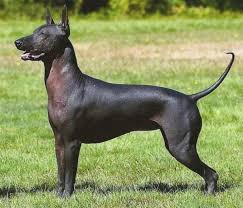
Khala
Conditions of detention
Khalas are adaptable and can thrive in various living conditions, from rural to urban environments. However, they require protection from extreme temperatures, particularly cold weather, due to their lack of fur.
Useful Fact: Khalas enjoy being indoors with their families and need a warm, comfortable place to rest, especially in colder climates.
Nutrition and diet
A balanced diet rich in high-quality protein, fats, and essential nutrients is crucial for a Khala’s health. Both high-quality commercial dog food and well-prepared homemade diets can meet their nutritional needs.
Useful Fact: Because Khalas have sensitive skin, a diet that supports skin health, including omega-3 and omega-6 fatty acids, is beneficial.
Health
Khalas are generally healthy dogs with a lifespan of 12-16 years. They can be prone to certain conditions such as dental issues and skin problems due to their hairlessness.
Useful Fact: Regular dental care and skin protection (such as applying dog-safe sunscreen) are essential for maintaining the health of a Khala.
Grooming and care
Khalas have unique grooming needs due to their hairlessness. Their skin requires regular moisturizing to prevent dryness and protection from the sun.
Useful Fact: Regular baths and the application of hypoallergenic lotions can help keep a Khala’s skin healthy and hydrated.
Education and training
Khalas are intelligent and eager to please but can sometimes be independent. Consistent training with positive reinforcement methods works best for this breed.
Useful Fact: Early socialization and obedience training are crucial for Khalas to develop into well-mannered adults, helping them balance their independent nature with good behavior.
Toys and entertainment
Khalas enjoy toys that challenge their minds and provide physical exercise. They particularly love interactive toys and activities that involve play and companionship.
Useful Fact: Providing a variety of toys and engaging in regular play sessions can help keep a Khala mentally and physically stimulated.
Safety
Ensure your Khala has a secure environment, especially during outdoor activities, to prevent them from wandering. Their lack of fur makes them more vulnerable to environmental hazards.
Useful Fact: Khalas should wear dog-friendly clothing during cold weather and have access to shaded areas in hot weather to protect their skin.
Accessories
A sturdy leash, comfortable harness, and ID tags are essential for your Khala’s safety during walks and outings.
Useful Fact: Due to their sensitive skin, Khalas benefit from wearing a soft, well-fitted harness to avoid irritation.
Socialization
Early and continuous socialization is crucial for Khalas to ensure they are comfortable around people, other dogs, and different environments.
Useful Fact: Positive socialization experiences from a young age can help Khalas develop into well-adjusted adults, reducing the likelihood of fear or aggression.
Travel and Transportation
Khalas can travel well if accustomed to it from a young age. Ensure they have a comfortable crate or seatbelt harness for car rides.
Useful Fact: Regular short trips can help your Khala become more comfortable with travel and reduce anxiety during longer journeys.
Behavior and psychology
Khalas are known for their loyalty, intelligence, and independent nature. Understanding their behavior and providing appropriate outlets for their energy is important.
Useful Fact: Mental stimulation through training and interactive play is as important as physical exercise for a Khala’s well-being.
Legal aspects
Owning a Khala may come with specific legal requirements depending on your location, such as licensing, microchipping, and adherence to leash laws.
Useful Fact: Research local regulations and ensure you comply with any breed-specific legislation or requirements.


